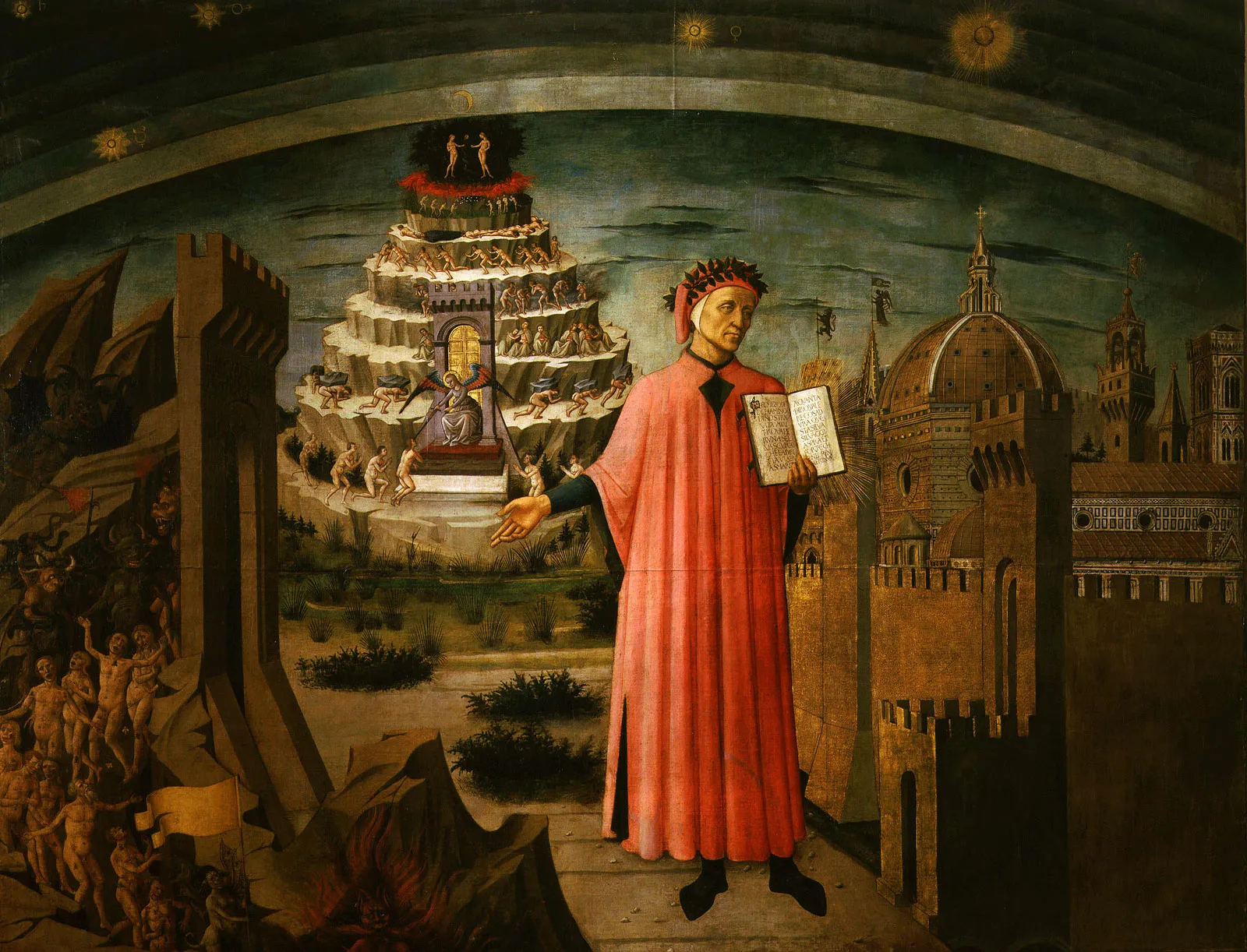
Dante Alighieri, one of the most celebrated poets of the Middle Ages, is best known for his magnum opus The Divine Comedy. However, his contributions extend beyond literature, particularly in the realm of linguistic theory. While Dante’s work on language is often overshadowed by his poetic legacy, his exploration of linguistic principles, especially in his treatise De Vulgari Eloquentia, reveals an early understanding of language’s systematic nature. In this article, we will delve into the relationship between Dante and universal grammar, analyzing his views on language, their connection to modern linguistic theories, and the relevance of his ideas today.
Universal grammar, a concept most famously associated with Noam Chomsky, posits that underlying all human languages are certain innate structures and rules. The idea is that all languages share a common foundation in how they are processed by the human brain. While Dante lived centuries before this formal theory was developed, his linguistic insights and search for a “perfect language” laid some groundwork for future linguistic inquiry.
Dante’s View of Language in Medieval Context
Dante’s Multilingual World
Dante lived in a time when language was a subject of considerable debate. Latin was the dominant language of the educated elite, while various vernacular languages were spoken by the common people across Europe. Dante himself, like many of his contemporaries, was fluent in Latin, but he also recognized the importance of vernacular languages. His quest to elevate the vernacular to a literary and philosophical language culminated in his work, De Vulgari Eloquentia.
In De Vulgari Eloquentia, Dante argues that vernacular languages deserve the same respect and status as Latin, which was seen as the language of knowledge and culture. Dante’s desire to craft a perfect vernacular for literary expression reflects his belief that language, in all its forms, is a fundamental human capacity. This ties into the modern concept of universal grammar, which suggests that all humans possess an inherent ability to learn and use language, regardless of the specific language spoken.
Language and Thought in Dante’s Writings
Dante’s writings reveal a deep connection between language and thought, an idea central to universal grammar. In The Divine Comedy, Dante uses language not only as a means of storytelling but also as a tool for exploring philosophical and theological concepts. His use of allegory, metaphor, and symbolism highlights his belief in language’s power to convey complex ideas.
Furthermore, in De Vulgari Eloquentia, Dante suggests that the structure of language reflects the structure of thought. This aligns with the theory of universal grammar, which posits that the way humans process language is deeply tied to cognitive structures common to all people.
The Concept of Universal Grammar
What is Universal Grammar?
Universal grammar is a theory in linguistics that suggests all human languages share a common set of structural rules. Noam Chomsky, who developed this theory in the 1950s, argued that the human brain is hardwired to understand language. According to this theory, while individual languages may vary in vocabulary and syntax, they all operate based on the same underlying principles.
The idea of universal grammar challenges the notion that language is solely a learned behavior, proposing instead that the ability to acquire language is innate. This theory has sparked significant debate and research in linguistics, cognitive science, and psychology.
Dante’s Implicit Understanding of Universal Grammar
Though Dante did not explicitly theorize about universal grammar, his writings suggest that he grasped certain foundational aspects of the concept. In De Vulgari Eloquentia, Dante explores the idea that all languages, whether vernacular or classical, have an underlying structure that can be analyzed and understood. He was particularly interested in finding commonalities between different dialects and languages in Italy, which echoes the modern search for universal linguistic patterns.
Dante’s insistence on the legitimacy of vernacular languages demonstrates his understanding that all human languages have the potential for complex expression, a notion that aligns with the principles of universal grammar.
Dante’s Contribution to the Study of Language
De Vulgari Eloquentia: A Search for the Perfect Language
One of Dante’s most important contributions to the study of language is his treatise De Vulgari Eloquentia. In this work, he sets out to define and elevate the Italian vernacular. At the time, Latin was the dominant language of scholarly and literary expression, and vernacular languages were seen as inferior. Dante challenged this view, arguing that the vernacular could be a legitimate vehicle for sophisticated thought and artistic expression.
In his search for the “illustrious vernacular,” Dante was essentially searching for a form of universal grammar. He sought a language that could be understood by all Italians, regardless of regional dialect, and that could serve as a tool for both everyday communication and literary creation. This idea resonates with the modern concept of universal grammar, which holds that all languages share a common underlying structure.
Language as a Unifying Force
For Dante, language was not just a tool for communication; it was a force that could unify people. He believed that a common language could bring together the diverse regions of Italy, which were fragmented by different dialects and local customs. This idea of language as a unifying force is a theme that runs throughout Dante’s work, and it is reflected in his efforts to create a common vernacular for literary and philosophical expression.
In the context of universal grammar, Dante’s desire for a unifying language can be seen as an early recognition of the shared linguistic structures that bind humanity together. By seeking a language that could transcend regional differences, Dante was implicitly acknowledging the universality of human language.
Dante and the Evolution of Linguistic Thought
Dante’s Influence on Modern Linguistics
Dante’s work, particularly De Vulgari Eloquentia, has had a lasting impact on the study of language. His defense of vernacular languages helped pave the way for the acceptance of modern languages as legitimate vehicles for scholarly and literary expression. In the centuries following Dante’s death, European intellectuals began to recognize the value of their native languages, leading to the development of national literatures and the eventual decline of Latin as the dominant language of culture and scholarship.
While Dante’s work predates the formal development of universal grammar by several centuries, his insights into the nature of language and thought laid the groundwork for later linguistic theories. His recognition of the importance of structure and his belief in the universality of language anticipated some of the key ideas that would later be articulated by linguists like Chomsky.
Universal Grammar and Cognitive Science
The theory of universal grammar has had a profound impact on the field of cognitive science, as it suggests that language is not simply a cultural artifact but a fundamental aspect of human cognition. In this sense, Dante’s exploration of language as a reflection of thought can be seen as an early precursor to modern cognitive theories of language.
By suggesting that all languages share common underlying principles, universal grammar provides a framework for understanding how the human brain processes language. This idea has important implications for the study of language acquisition, language disorders, and artificial intelligence.
The Relevance of Dante and Universal Grammar Today
Dante’s Legacy in Linguistic Theory
Dante’s contributions to the study of language continue to resonate in the field of linguistics. His defense of vernacular languages and his exploration of linguistic structure have inspired generations of scholars to examine the relationships between language, thought, and culture. While Dante did not explicitly theorize about universal grammar, his work anticipated many of the questions that would later be central to the field of linguistics.
The Modern Quest for Universal Grammar
The search for universal grammar is an ongoing project in modern linguistics. Researchers continue to explore the underlying structures that govern all human languages, seeking to understand how these structures are represented in the brain. Dante’s work on language serves as a reminder that the quest for linguistic universality is not a new one; it is a project that has its roots in centuries-old debates about the nature of language and thought.
Conclusion: Dante’s Timeless Influence on Language and Universal Grammar
The relationship between Dante and universal grammar highlights the enduring relevance of Dante’s linguistic insights. While he lived in a time before formal linguistic theory, Dante’s work on language reflects a deep understanding of the structures and principles that govern human communication. His defense of the vernacular, his exploration of the relationship between language and thought, and his search for a unifying language all resonate with modern theories of universal grammar.
Dante’s contributions to the study of language remind us that the quest to understand the nature of human communication is not confined to modern linguistic theory. It is a project that spans centuries, and Dante’s work continues to inspire and inform scholars today. Whether through his poetic masterpieces or his linguistic treatises, Dante remains a central figure in the study of language, and his insights into the universality of human language continue to shape our understanding of how we communicate.
Frequently Asked Questions (FAQs)
1. What is Dante’s connection to universal grammar?
Dante’s linguistic work, particularly in De Vulgari Eloquentia, explores the structure of language and anticipates some of the ideas central to modern universal grammar theory.
2. How does Dante’s work relate to modern linguistics?
Dante’s defense of vernacular languages and his exploration of linguistic structure laid the groundwork for later linguistic theories, including universal grammar.
3. What is universal grammar?
Universal grammar is a linguistic theory that suggests all human languages share a common set of underlying principles.
4. Did Dante contribute to the study of vernacular languages?
Yes, Dante was a strong advocate for the use of vernacular languages in literary and philosophical expression, a revolutionary idea in his time.
5. How does Dante’s view of language compare to Chomsky’s universal grammar?
While Dante did not theorize about universal grammar directly, his exploration of language as a reflection of thought aligns with the idea that all languages share a common structure.




